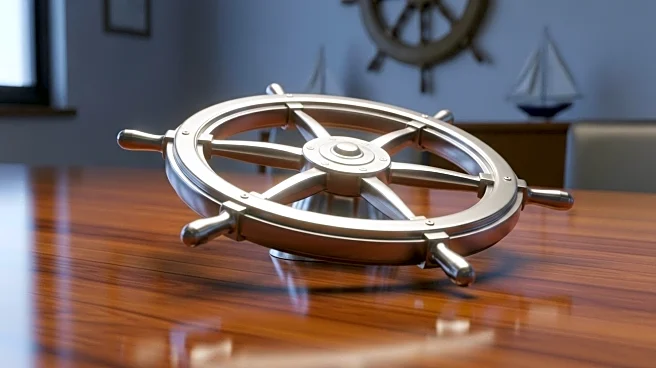What's Happening?
The Maritime Cyprus 2025 Conference commenced in Limassol, gathering over a thousand participants from 35 countries, including heads of state, ministers, and industry leaders. The event, organized by the Shipping Deputy Ministry, the Cyprus Union of Shipowners, and the Cyprus Shipping Chamber, aims to address key challenges in the maritime sector such as decarbonization, digitalization, and geopolitical uncertainties. President Nikos Christodoulides of Cyprus highlighted the country's commitment to enhancing its shipping competitiveness and announced the digitalization of services within the Shipping Deputy Ministry. The conference also featured discussions on policy coordination, investment in human capital, and innovation as drivers of maritime transformation.
Why It's Important?
The conference underscores Cyprus's strategic role in the global maritime industry, emphasizing the need for collaboration and innovation to tackle pressing challenges. The discussions on decarbonization and digitalization are crucial as the shipping industry seeks to reduce its environmental impact and improve efficiency. The event also highlights the importance of regional cooperation and the alignment of national policies with international regulations, which are vital for maintaining competitiveness and ensuring sustainable growth in the maritime sector. The outcomes of this conference could influence policy decisions and industry practices, impacting stakeholders across the shipping industry.
What's Next?
As Cyprus prepares for its forthcoming Presidency of the Council of the European Union, maritime competitiveness and sustainable growth will be central to its agenda. The conference discussions are expected to inform the development of a European Industrial Maritime Strategy and a European Port Strategy. These initiatives aim to promote innovation, fair competition, and the use of clean technologies. The conference will continue with sessions on P&I markets, shipowner perspectives, and innovation through youth engagement, potentially shaping future maritime policies and industry practices.
Beyond the Headlines
The conference also delves into the ethical and economic implications of maritime policies, such as the balance between environmental goals and economic realities. The discussions on decarbonization highlight the tension between regulatory ambitions and technological capabilities, with industry leaders advocating for practical and achievable measures. The event also emphasizes the role of human capital in driving the sector forward, suggesting a shift towards more inclusive and collaborative decision-making processes in the maritime industry.











